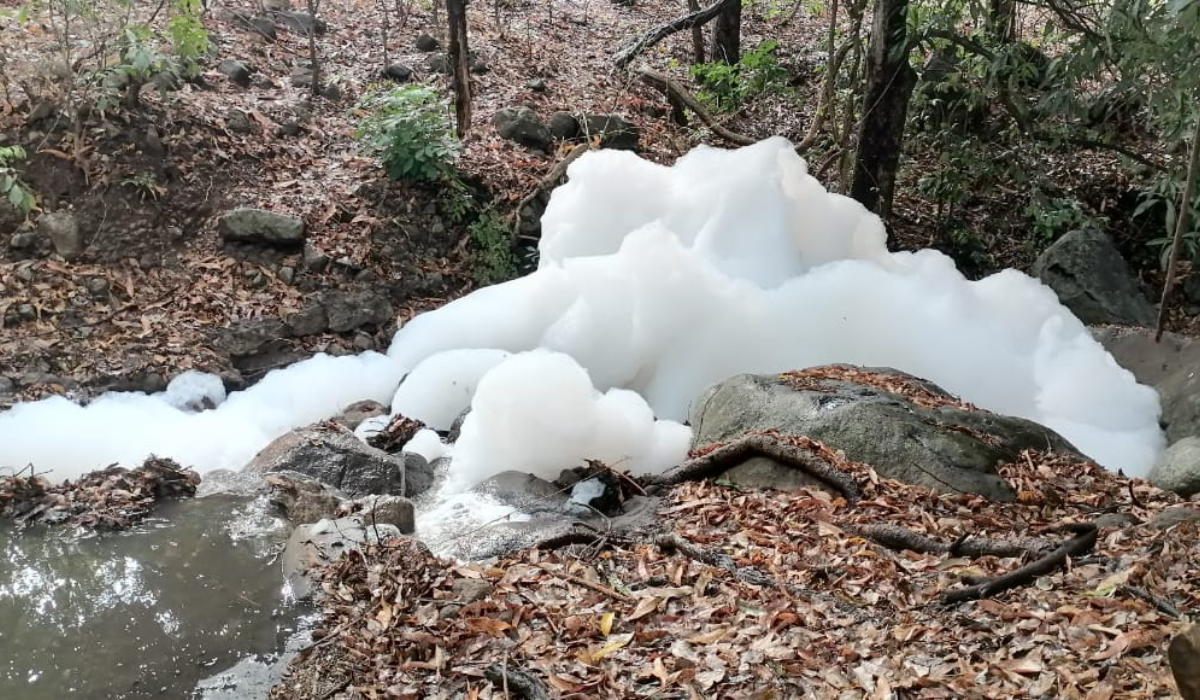Residents of Tecoluca, San Vicente, report that in recent days there has been an increase in pollution in the rivers near the Center for the Confinement of Terrorism (CECOT). They fear for the environmental impact and their families’ health.
Residents of communities near the mega-prison reported that at dawn on Friday, April 25, they observed large streams of water with white foam, similar to that produced by soap.
YSUCA spoke with Tecoluca locals to learn details about this issue. “It was a gush of water as if a heavy storm had hit the night before, but really there was only a light drizzle in the early morning,” says one resident.
Those interviewed state that the foamy water flowed through the El Obraje and El Limón rivers. They explain that the source of these water currents is in the area near the CECOT. They recall that before the prison project, they did not suffer from this type of problem.
One affected individual expressed concern and uncertainty, asking, “What kind of chemicals are being used in the Tecoluca mega-prison?” He warns of the damage this could cause to their crops and livestock.
Esteban Orantes is a resident of these communities and says he observed the foam in the water of both rivers all day Friday.
In July 2024, the organization Cristosal reported that the water consumed by the communities of El Milagro, San Francisco Angulo, and Cantarrana, located in Tecoluca, San Vicente, is highly contaminated with fecal coliforms and other bacteria, making it unfit for human consumption or personal hygiene, according to specialists.
At that time, the organization urged the state to stop the pollution allegedly being generated by the CECOT in the water sources supplying communities near the penitentiary facility. However, those affected report that the problem persists and they perceive no willingness from authorities to provide assistance.
The Ministerio de Obras Públicas y de Transporte (Ministry of Public Works and Transportation) classified information for seven years regarding the wastewater treatment plant at the Center for the Confinement of Terrorism (CECOT), as well as information about the infrastructure equipment of this and other penitentiary centers in El Salvador.
Habitantes de Tecoluca denuncian presencia de espuma blanca en ríos cercanos al CECOT
Habitantes de Tecoluca, San Vicente, denuncian que en los últimos días ha habido un aumento en la contaminación de los ríos cercanos al Centro de Confinamiento del Terrorismo -CECOT-. Temen por el impacto ambiental y la salud de sus familias.
Residentes de las comunidades cercanas a la mega prisión reportaron que, al amanecer del viernes 25 de abril, observaron grandes corrientes de agua con espuma blanca, similar a la que produce el jabón.
YSUCA conversó con lugareños de Tecoluca para conocer detalles de esta problemática. Eran un chorro de agua como si hubiera caído una fuerte tormenta en la noche anterior, pero realmente solo hubo una pequeña llovizna en la madrugada, dice un habitante.
Los entrevistados afirman que el agua con espuma corría por los ríos El Obraje y El Limón. Explican que el origen de estas corrientes de agua se encuentran en la zona cercana al CECOT. Recuerdan que antes del proyecto carcelario no sufrían por este tipo de afectaciones.
Uno de los perjudicados expresó preocupación e incertidumbre y se cuestiona ¿Qué tipo de químicos se están utilizando en la mega cárcel de Tecoluca? Advierte el daño que esto puede ocasionar en sus cultivos y ganado.
Esteban Orantes es habitante de esas comunidades y cuenta que todo el día viernes observó esa espuma en el agua de ambos ríos.
En julio del 2024, la organización Cristosal informó que el agua que consumen las comunidades El Milagro, San Francisco Angulo y Cantarrana, ubicadas en Tecoluca, San Vicente, está altamente contaminada por coliformes fecales y otras bacterias que la vuelven no apta para el consumo humano, ni para la higiene personal, según especialistas.
En esa fecha, la organización instó al Estado a detener la contaminación que, presuntamente, estaría generando el CECOT en los afluentes que abastecen a las comunidades cercanas al recinto penitenciario. Sin embargo, los afectados denuncian que el problema persiste y que no perciben voluntad de las autoridades para brindarles ayuda.
El Ministerio de Obras Públicas y de Transporte colocó reserva de siete años sobre la planta de tratamiento de aguas residuales en el Centro de Confinamiento del Terrorismo -CECOT- así como información sobre equipamiento de infraestructura de este y otros centros penitenciarios de El Salvador.

